CAVLC
1.什么是CAVLC?
Context Adaptive Variable Length Coding (CAVLC) is a method used to encode residual, scan ordered blocks of transform coefficients.
2.CAVLC是怎么工作?
- 对于量化后的4 * 4的block, CAVLC使用run-level来represent strings of zeros.
- Context Adaptive 的意思就是通过上下文自动调节的一种编码,所以这边CAVLC是通过附近4 * 4的block的情况来选择自己的"VLC table", 用这个VLC talbe 来编码 coeff_token.
- 对于高频的值,如果取值为1,-1之类的。使用"Trailing 1s" or "T1s" 来表示. 0代表1, 1代表-1. 最多只能表示3个trailing ones.
- CAVLC编码包括一下几个步骤
| 1.编码 coeff_token, coeff_token代表了有多少个trailing zeros, 以及有多少个no-zero coefficients |
|---|
| 2.编码trailing ones, 代表了是+1 还是 -1 |
| 3.编码non-zero coefficients 的值,从高频到低频 |
| 4.编码最后一个none-zero coefficients 之前的所有的0的个数 |
| 5. 编码每个none-zero coefficients 之前有多少个0 |
3.CAVLC工作流程图
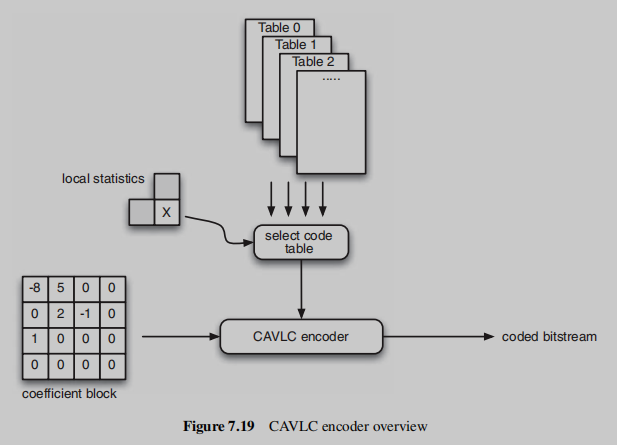
4. 编码coeff_token 以及 VLC Table 的选择
coeff_token必须使用VLC Table来查找对应的二进制.
coeff_token 编码了 Toal-Coeffs 代表非 0 coefficient的个数,取值从0到16.同时也编码了 Trailiing 1s(T1s). 从 0 到 3. 代表有多少个coefficient数据是1 或者 -1,从高频到低频排序.
For Luma, Chroma DC (4:4:4) and Chroma AC.
(T1, numCoeff) will be coded based on nCContext. nCContext = (nCA + nCB + 1) >> 1. nCA is the number of nonzero coefficients available in the left 4x4 submacroblock and nCB is the number of nonzero coefficients available in the up 4x4 submacroblock.
如果nCb不可以用,nCC = nCb.
如果nCa不可以用,nCC = nCa.
如果两者都不可以用,nCC = 0;
根据nC,T1 ,numCoeff 编码 coeff_token,如下图
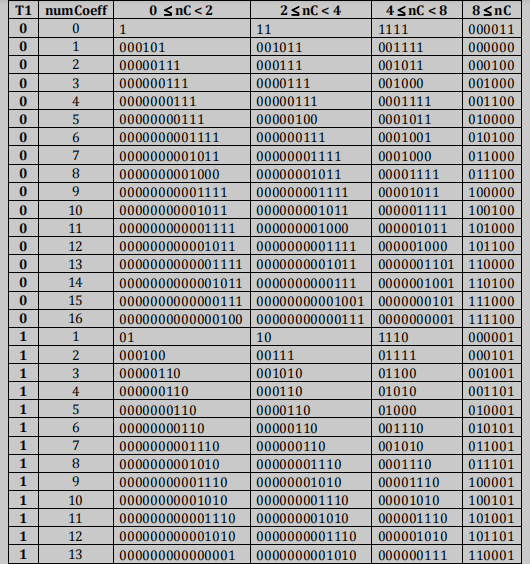
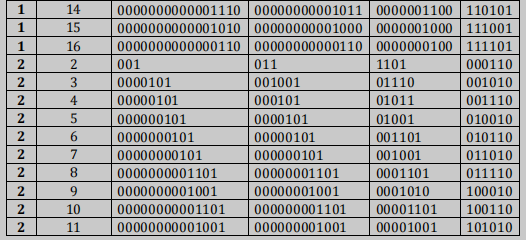
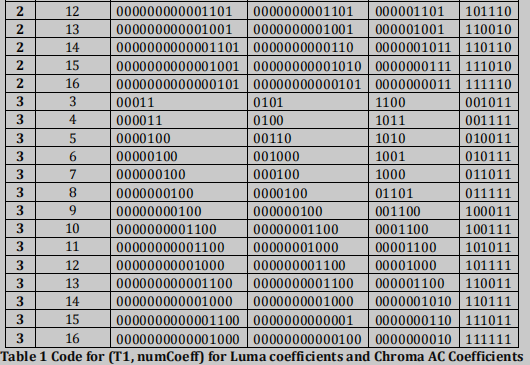
For ChromaDC.
| If chroma_format_idc is equal to 1, nC is set equal to -1 |
|---|
| Otherwise,if chroma_format_idc is equal to 2, nC is set equal to -2 |
| Otherwise (chroma_format_idc is equal to 3), nC is set equal to 0 |
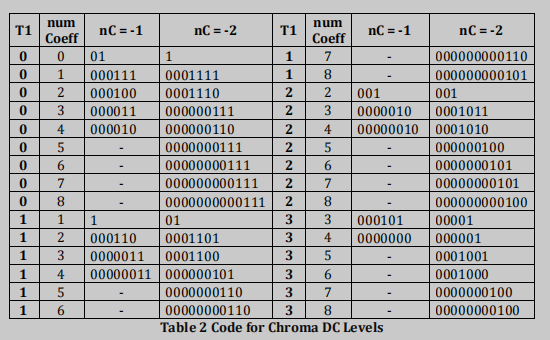 |
5. 编码 trailing 1s 的符号位
顺序为从高频到低频, 0 = +1, 1 = -1.
6. 编码 level of remaing non-zero coefficients.
level 由两个部分组成 prefix 和 suffix. 通俗的来说就是,prefix代表了高位的数据,suffix代表了低位的数据.
prefix总是以1结尾.
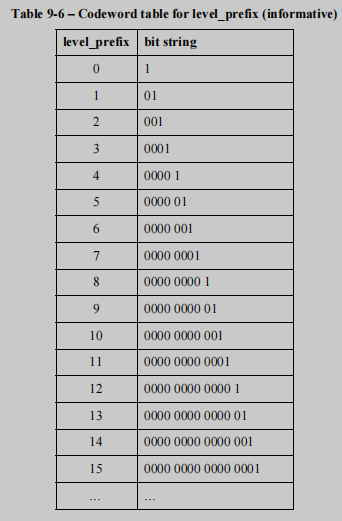
官方decoding代码
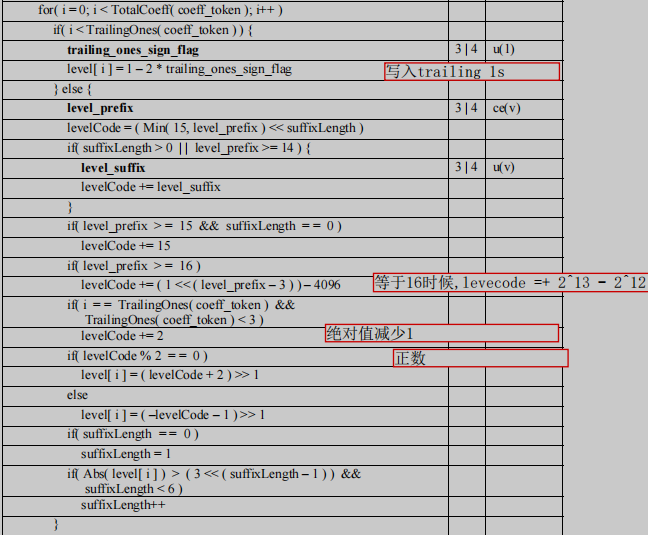
Encoding level算法
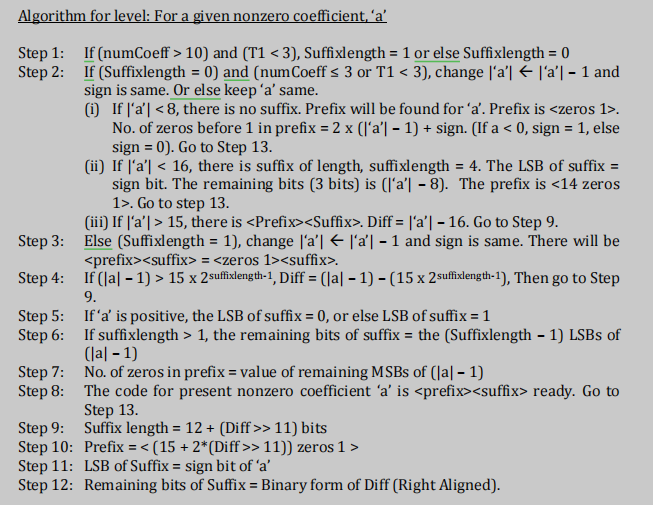
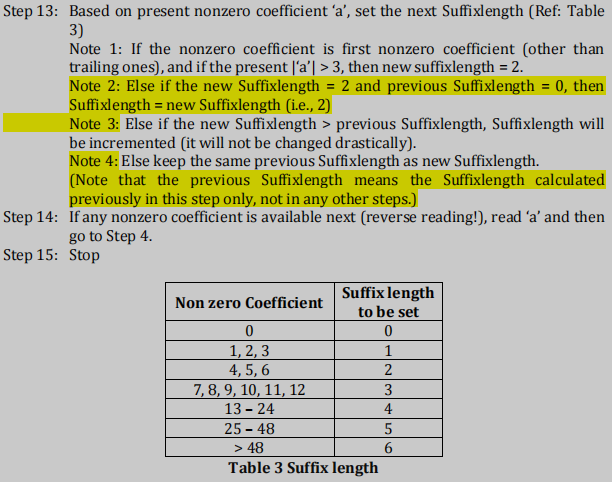
encoding level算法的例子.
假设如下4*4block
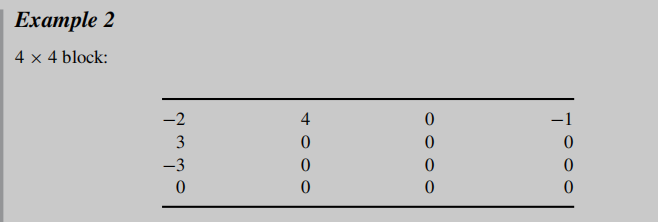
Reordered block:−2, 4, 3, −3, 0, 0, −1, ...
TotalCoeffs = 5
TotalZeros = 2
T1s = 1
- encoding a = -3的时候.
step2: |a| = |a| - 1. a = -2;
|a| < 8, number of zeros = 2 * (|-2| - 1) + (1) = 3;
所以值就为 <0001><>
更新suffxLength = 1; - encoding a = 3的时候.
step3: |a| = |a| - 1, a = 2;
step5: 符号为正数, 所以suffix的最后一位为0.
step7: number of remaing zeros = 2;
所以值为<001><0> - encoding a = 4的时候.
step3: |a| = |a| - 1, a = 3;
step5:符号为正数, 所以suffix的最后一位为0.
step7: number of remaing zeros = 3;
值为<0001><0>
更新suffxLength = 2;
4.encoding a = -2
step5: suffix 最后一位,符号位为1.
step6: |a| - 1 = 1B(二进制的1). suffix就为<11>
step7: number of zeros = 0;
值为<1><11>
7.编码 total number of zeros before the last coefficient
For Luma, Chroma DC (4:4:4) and Chroma AC, the (total_zeros, numCoeff) table
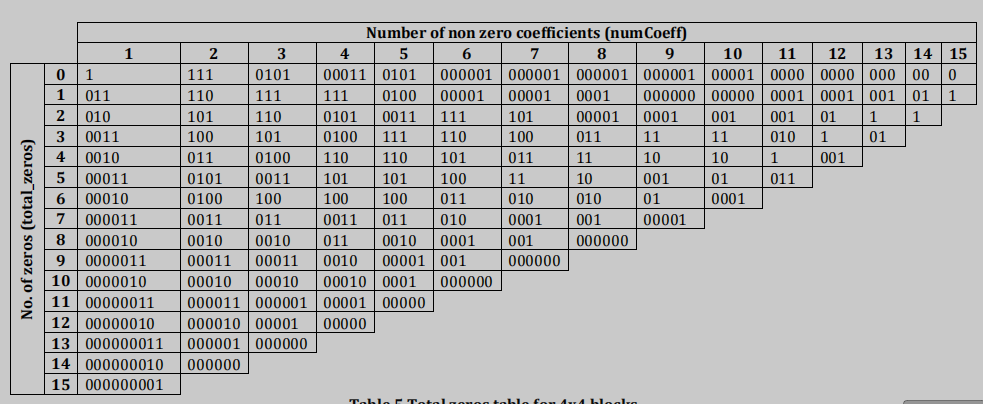
For Chroma DC (4:2:0), the code for total_zeros
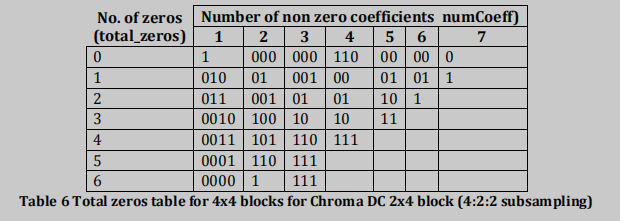
for Chroma DC (4:2:2)

8.编码 run before
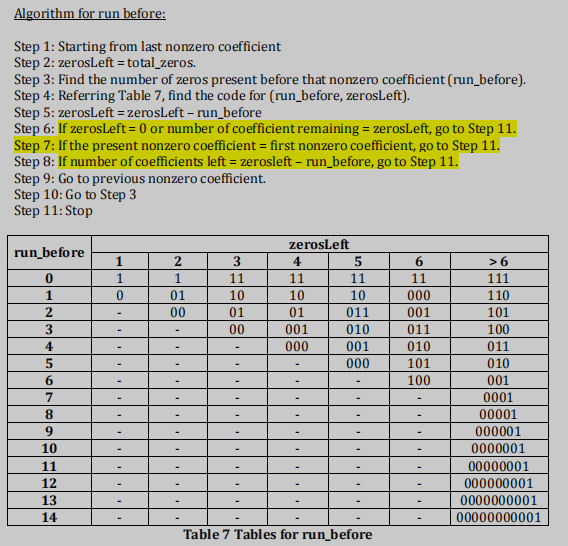
需要注意的点
- CAVLC uses run-level coding to to compactly represent strings of zeros.
- if CAVLC is used with 8 * 8 interger transform, each 8 * 8 block of quantized transform coeffients is processed as 4 * 4 blocks for the purpose of CAVLC encoding and decoding.
资料来源
- The H.264 Advanced Video Compression Standards
- T-REC-H.264-200503-S!!PDF-E
- CAVLC (Context based Adaptive Variable Length Coding)


 浙公网安备 33010602011771号
浙公网安备 33010602011771号